Cox & Kings: International Travel and Tourism Report Analysis
VerifiedAdded on 2023/01/12
|12
|4304
|85
Report
AI Summary
This report provides an in-depth analysis of Cox & Kings, a major travel company, focusing on its revenue management strategies, financial reporting, and human resources practices. It defines revenue management, exploring its principles, such as historical demand and market segmentation, and the application of tools like pricing and inventory management, demand forecasting, and overbooking to maximize profits. The report examines pricing strategies, including penetration pricing and price skimming, and the importance of financial statements like income statements and balance sheets in assessing the company's financial health. Additionally, the report discusses the role of budgeting in controlling business performance and touches upon the HR lifecycle and relevant legislation within the travel and tourism sector. The report highlights the importance of these factors in the success of the business.
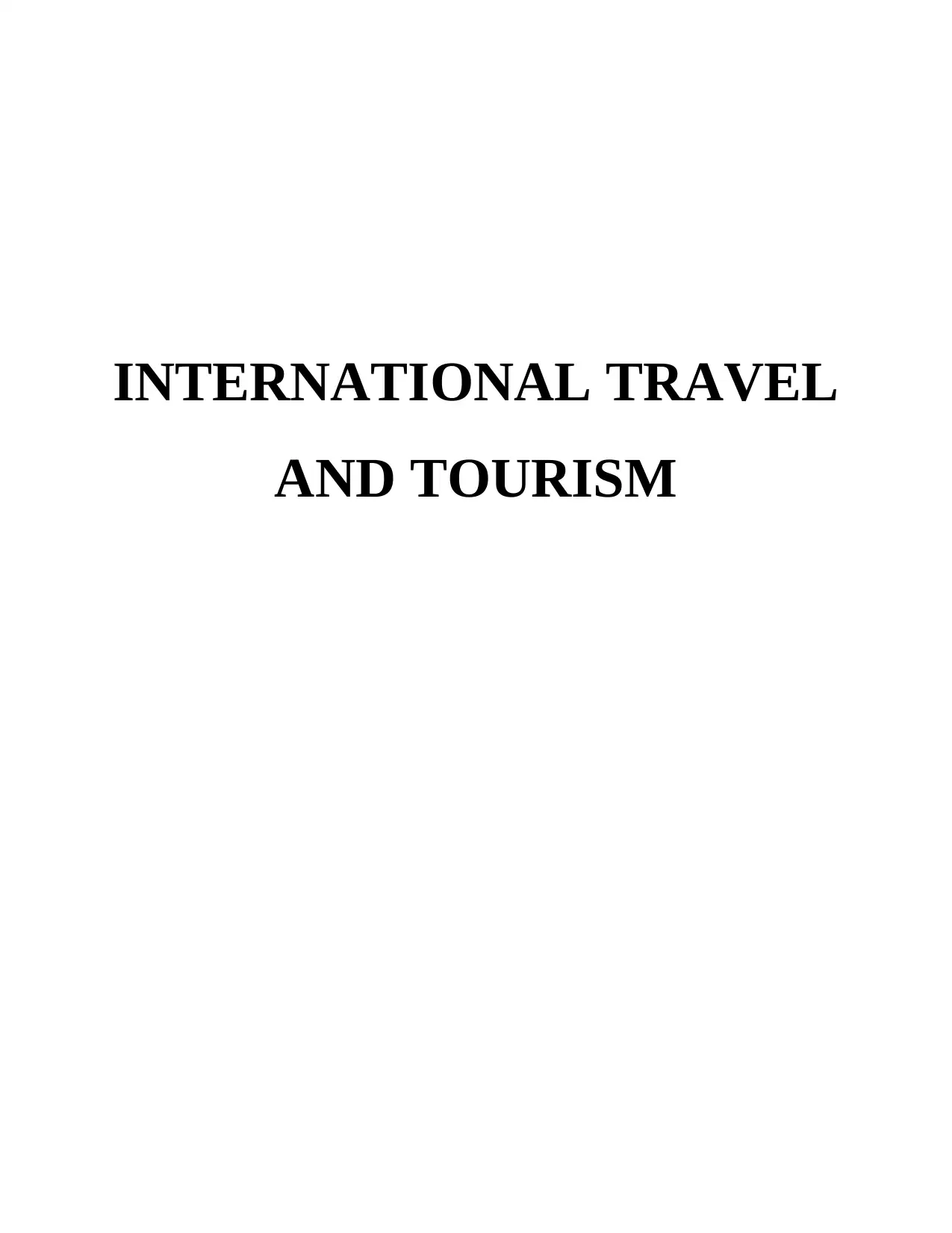
INTERNATIONAL TRAVEL
AND TOURISM
AND TOURISM
Paraphrase This Document
Need a fresh take? Get an instant paraphrase of this document with our AI Paraphraser
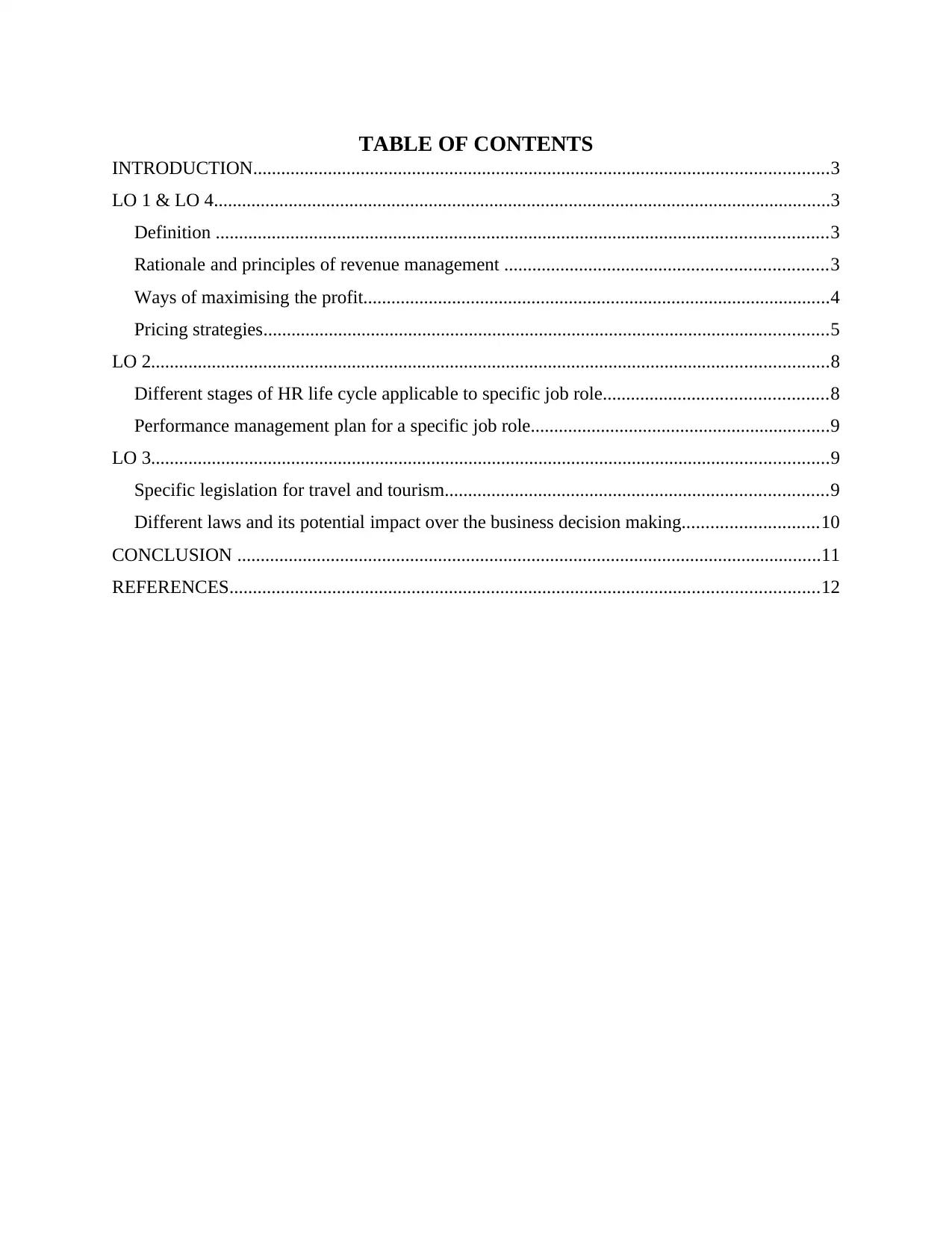
TABLE OF CONTENTS
INTRODUCTION...........................................................................................................................3
LO 1 & LO 4....................................................................................................................................3
Definition ...................................................................................................................................3
Rationale and principles of revenue management .....................................................................3
Ways of maximising the profit....................................................................................................4
Pricing strategies.........................................................................................................................5
LO 2.................................................................................................................................................8
Different stages of HR life cycle applicable to specific job role................................................8
Performance management plan for a specific job role................................................................9
LO 3.................................................................................................................................................9
Specific legislation for travel and tourism..................................................................................9
Different laws and its potential impact over the business decision making.............................10
CONCLUSION .............................................................................................................................11
REFERENCES..............................................................................................................................12
INTRODUCTION...........................................................................................................................3
LO 1 & LO 4....................................................................................................................................3
Definition ...................................................................................................................................3
Rationale and principles of revenue management .....................................................................3
Ways of maximising the profit....................................................................................................4
Pricing strategies.........................................................................................................................5
LO 2.................................................................................................................................................8
Different stages of HR life cycle applicable to specific job role................................................8
Performance management plan for a specific job role................................................................9
LO 3.................................................................................................................................................9
Specific legislation for travel and tourism..................................................................................9
Different laws and its potential impact over the business decision making.............................10
CONCLUSION .............................................................................................................................11
REFERENCES..............................................................................................................................12
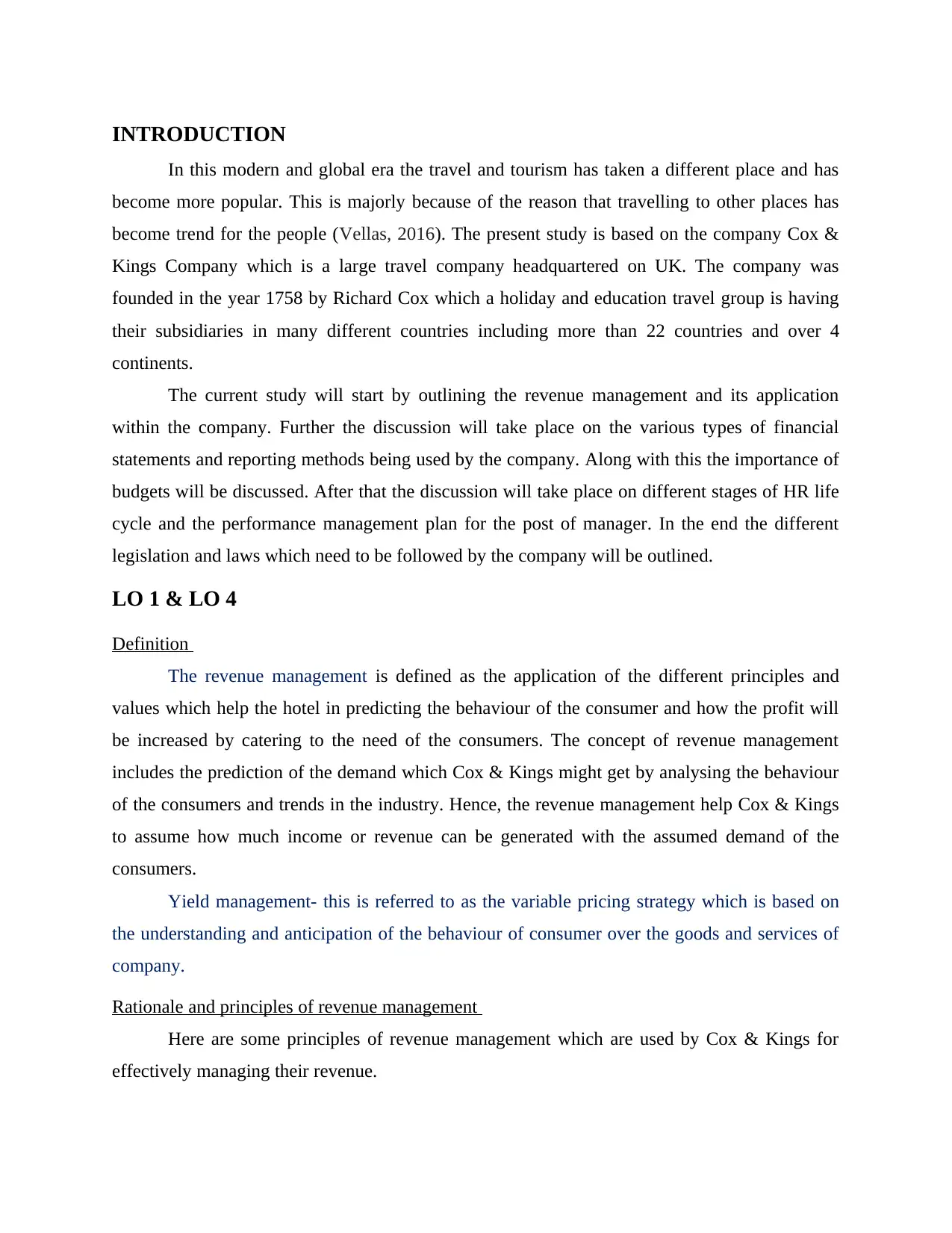
INTRODUCTION
In this modern and global era the travel and tourism has taken a different place and has
become more popular. This is majorly because of the reason that travelling to other places has
become trend for the people (Vellas, 2016). The present study is based on the company Cox &
Kings Company which is a large travel company headquartered on UK. The company was
founded in the year 1758 by Richard Cox which a holiday and education travel group is having
their subsidiaries in many different countries including more than 22 countries and over 4
continents.
The current study will start by outlining the revenue management and its application
within the company. Further the discussion will take place on the various types of financial
statements and reporting methods being used by the company. Along with this the importance of
budgets will be discussed. After that the discussion will take place on different stages of HR life
cycle and the performance management plan for the post of manager. In the end the different
legislation and laws which need to be followed by the company will be outlined.
LO 1 & LO 4
Definition
The revenue management is defined as the application of the different principles and
values which help the hotel in predicting the behaviour of the consumer and how the profit will
be increased by catering to the need of the consumers. The concept of revenue management
includes the prediction of the demand which Cox & Kings might get by analysing the behaviour
of the consumers and trends in the industry. Hence, the revenue management help Cox & Kings
to assume how much income or revenue can be generated with the assumed demand of the
consumers.
Yield management- this is referred to as the variable pricing strategy which is based on
the understanding and anticipation of the behaviour of consumer over the goods and services of
company.
Rationale and principles of revenue management
Here are some principles of revenue management which are used by Cox & Kings for
effectively managing their revenue.
In this modern and global era the travel and tourism has taken a different place and has
become more popular. This is majorly because of the reason that travelling to other places has
become trend for the people (Vellas, 2016). The present study is based on the company Cox &
Kings Company which is a large travel company headquartered on UK. The company was
founded in the year 1758 by Richard Cox which a holiday and education travel group is having
their subsidiaries in many different countries including more than 22 countries and over 4
continents.
The current study will start by outlining the revenue management and its application
within the company. Further the discussion will take place on the various types of financial
statements and reporting methods being used by the company. Along with this the importance of
budgets will be discussed. After that the discussion will take place on different stages of HR life
cycle and the performance management plan for the post of manager. In the end the different
legislation and laws which need to be followed by the company will be outlined.
LO 1 & LO 4
Definition
The revenue management is defined as the application of the different principles and
values which help the hotel in predicting the behaviour of the consumer and how the profit will
be increased by catering to the need of the consumers. The concept of revenue management
includes the prediction of the demand which Cox & Kings might get by analysing the behaviour
of the consumers and trends in the industry. Hence, the revenue management help Cox & Kings
to assume how much income or revenue can be generated with the assumed demand of the
consumers.
Yield management- this is referred to as the variable pricing strategy which is based on
the understanding and anticipation of the behaviour of consumer over the goods and services of
company.
Rationale and principles of revenue management
Here are some principles of revenue management which are used by Cox & Kings for
effectively managing their revenue.
⊘ This is a preview!⊘
Do you want full access?
Subscribe today to unlock all pages.

Trusted by 1+ million students worldwide
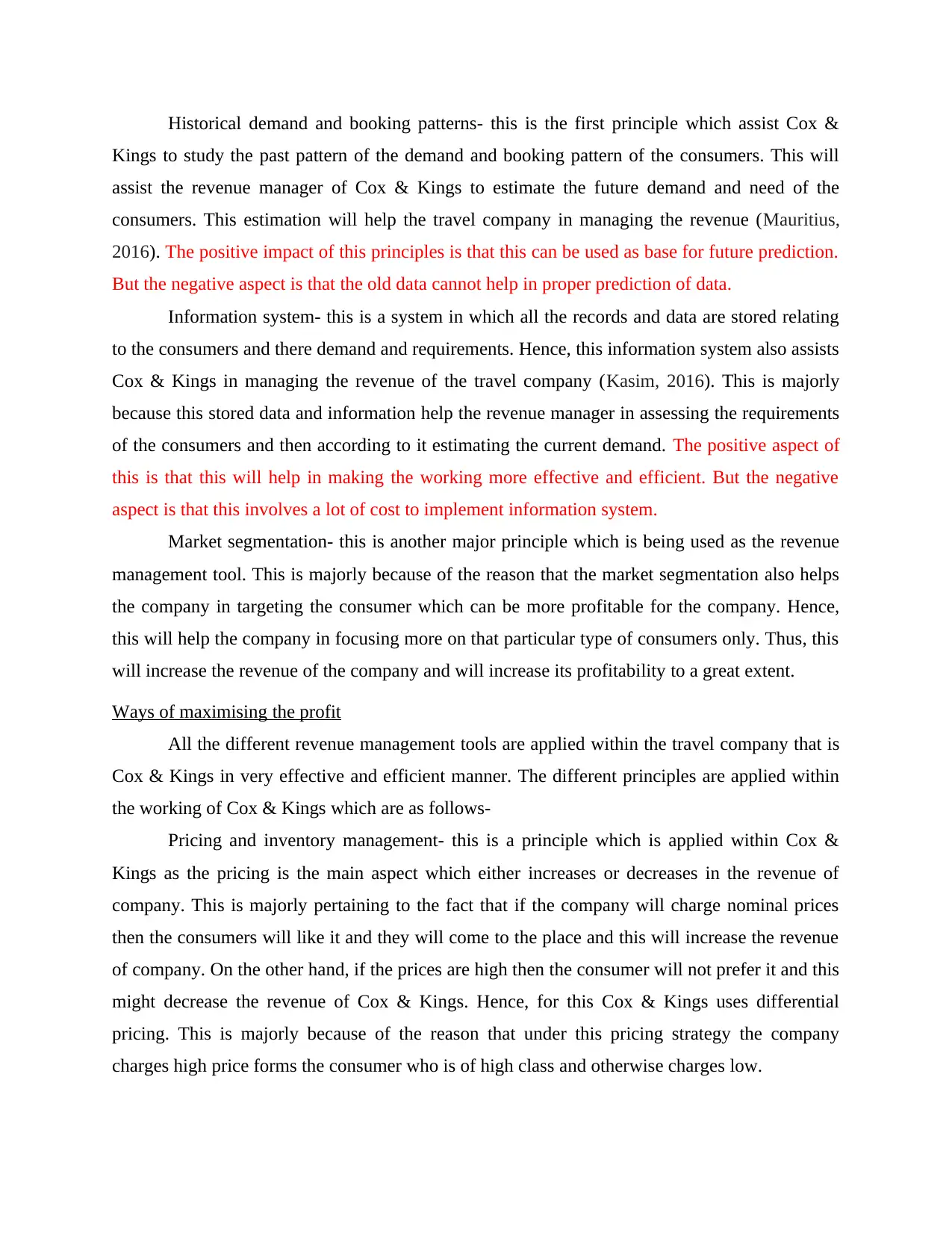
Historical demand and booking patterns- this is the first principle which assist Cox &
Kings to study the past pattern of the demand and booking pattern of the consumers. This will
assist the revenue manager of Cox & Kings to estimate the future demand and need of the
consumers. This estimation will help the travel company in managing the revenue (Mauritius,
2016). The positive impact of this principles is that this can be used as base for future prediction.
But the negative aspect is that the old data cannot help in proper prediction of data.
Information system- this is a system in which all the records and data are stored relating
to the consumers and there demand and requirements. Hence, this information system also assists
Cox & Kings in managing the revenue of the travel company (Kasim, 2016). This is majorly
because this stored data and information help the revenue manager in assessing the requirements
of the consumers and then according to it estimating the current demand. The positive aspect of
this is that this will help in making the working more effective and efficient. But the negative
aspect is that this involves a lot of cost to implement information system.
Market segmentation- this is another major principle which is being used as the revenue
management tool. This is majorly because of the reason that the market segmentation also helps
the company in targeting the consumer which can be more profitable for the company. Hence,
this will help the company in focusing more on that particular type of consumers only. Thus, this
will increase the revenue of the company and will increase its profitability to a great extent.
Ways of maximising the profit
All the different revenue management tools are applied within the travel company that is
Cox & Kings in very effective and efficient manner. The different principles are applied within
the working of Cox & Kings which are as follows-
Pricing and inventory management- this is a principle which is applied within Cox &
Kings as the pricing is the main aspect which either increases or decreases in the revenue of
company. This is majorly pertaining to the fact that if the company will charge nominal prices
then the consumers will like it and they will come to the place and this will increase the revenue
of company. On the other hand, if the prices are high then the consumer will not prefer it and this
might decrease the revenue of Cox & Kings. Hence, for this Cox & Kings uses differential
pricing. This is majorly because of the reason that under this pricing strategy the company
charges high price forms the consumer who is of high class and otherwise charges low.
Kings to study the past pattern of the demand and booking pattern of the consumers. This will
assist the revenue manager of Cox & Kings to estimate the future demand and need of the
consumers. This estimation will help the travel company in managing the revenue (Mauritius,
2016). The positive impact of this principles is that this can be used as base for future prediction.
But the negative aspect is that the old data cannot help in proper prediction of data.
Information system- this is a system in which all the records and data are stored relating
to the consumers and there demand and requirements. Hence, this information system also assists
Cox & Kings in managing the revenue of the travel company (Kasim, 2016). This is majorly
because this stored data and information help the revenue manager in assessing the requirements
of the consumers and then according to it estimating the current demand. The positive aspect of
this is that this will help in making the working more effective and efficient. But the negative
aspect is that this involves a lot of cost to implement information system.
Market segmentation- this is another major principle which is being used as the revenue
management tool. This is majorly because of the reason that the market segmentation also helps
the company in targeting the consumer which can be more profitable for the company. Hence,
this will help the company in focusing more on that particular type of consumers only. Thus, this
will increase the revenue of the company and will increase its profitability to a great extent.
Ways of maximising the profit
All the different revenue management tools are applied within the travel company that is
Cox & Kings in very effective and efficient manner. The different principles are applied within
the working of Cox & Kings which are as follows-
Pricing and inventory management- this is a principle which is applied within Cox &
Kings as the pricing is the main aspect which either increases or decreases in the revenue of
company. This is majorly pertaining to the fact that if the company will charge nominal prices
then the consumers will like it and they will come to the place and this will increase the revenue
of company. On the other hand, if the prices are high then the consumer will not prefer it and this
might decrease the revenue of Cox & Kings. Hence, for this Cox & Kings uses differential
pricing. This is majorly because of the reason that under this pricing strategy the company
charges high price forms the consumer who is of high class and otherwise charges low.
Paraphrase This Document
Need a fresh take? Get an instant paraphrase of this document with our AI Paraphraser
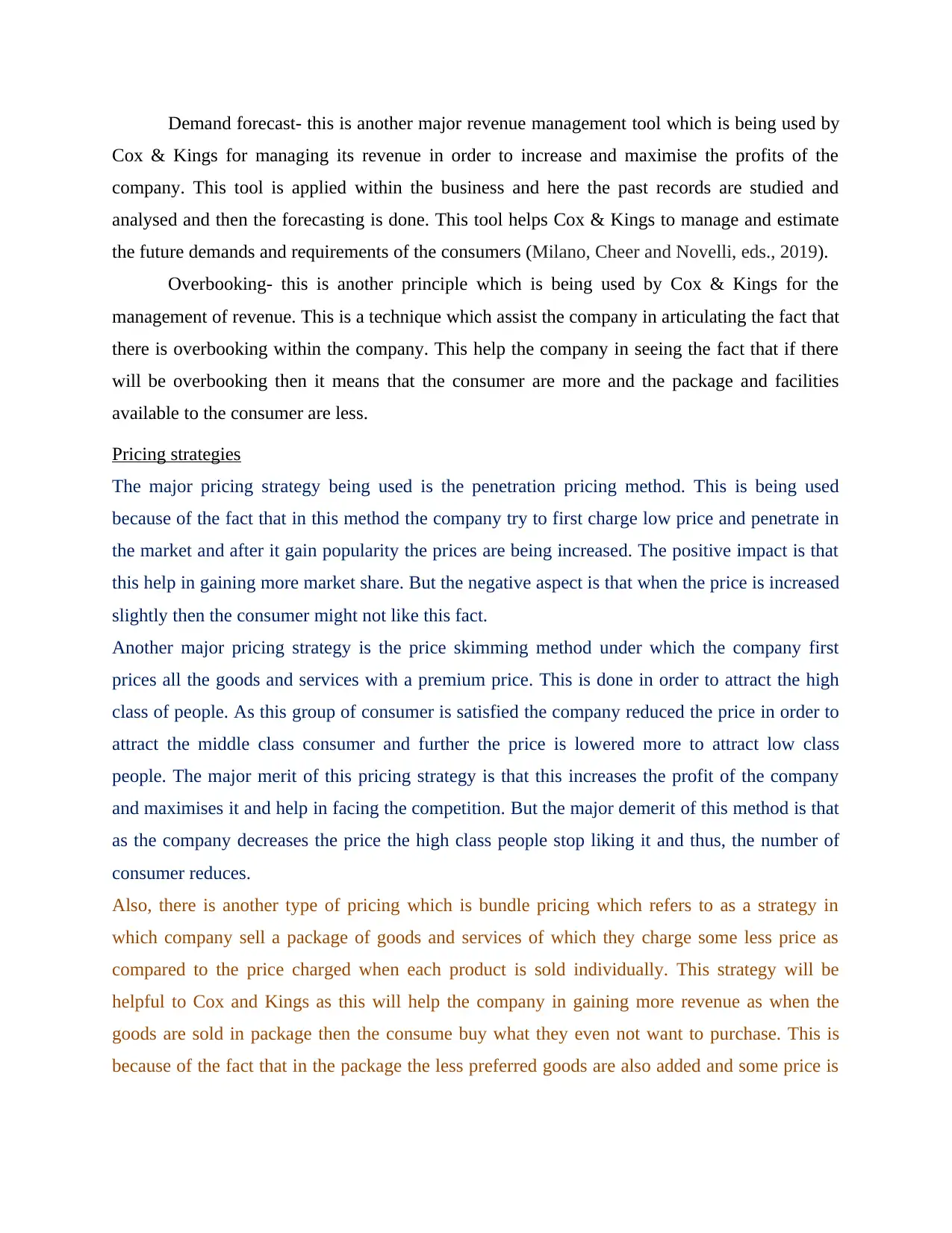
Demand forecast- this is another major revenue management tool which is being used by
Cox & Kings for managing its revenue in order to increase and maximise the profits of the
company. This tool is applied within the business and here the past records are studied and
analysed and then the forecasting is done. This tool helps Cox & Kings to manage and estimate
the future demands and requirements of the consumers (Milano, Cheer and Novelli, eds., 2019).
Overbooking- this is another principle which is being used by Cox & Kings for the
management of revenue. This is a technique which assist the company in articulating the fact that
there is overbooking within the company. This help the company in seeing the fact that if there
will be overbooking then it means that the consumer are more and the package and facilities
available to the consumer are less.
Pricing strategies
The major pricing strategy being used is the penetration pricing method. This is being used
because of the fact that in this method the company try to first charge low price and penetrate in
the market and after it gain popularity the prices are being increased. The positive impact is that
this help in gaining more market share. But the negative aspect is that when the price is increased
slightly then the consumer might not like this fact.
Another major pricing strategy is the price skimming method under which the company first
prices all the goods and services with a premium price. This is done in order to attract the high
class of people. As this group of consumer is satisfied the company reduced the price in order to
attract the middle class consumer and further the price is lowered more to attract low class
people. The major merit of this pricing strategy is that this increases the profit of the company
and maximises it and help in facing the competition. But the major demerit of this method is that
as the company decreases the price the high class people stop liking it and thus, the number of
consumer reduces.
Also, there is another type of pricing which is bundle pricing which refers to as a strategy in
which company sell a package of goods and services of which they charge some less price as
compared to the price charged when each product is sold individually. This strategy will be
helpful to Cox and Kings as this will help the company in gaining more revenue as when the
goods are sold in package then the consume buy what they even not want to purchase. This is
because of the fact that in the package the less preferred goods are also added and some price is
Cox & Kings for managing its revenue in order to increase and maximise the profits of the
company. This tool is applied within the business and here the past records are studied and
analysed and then the forecasting is done. This tool helps Cox & Kings to manage and estimate
the future demands and requirements of the consumers (Milano, Cheer and Novelli, eds., 2019).
Overbooking- this is another principle which is being used by Cox & Kings for the
management of revenue. This is a technique which assist the company in articulating the fact that
there is overbooking within the company. This help the company in seeing the fact that if there
will be overbooking then it means that the consumer are more and the package and facilities
available to the consumer are less.
Pricing strategies
The major pricing strategy being used is the penetration pricing method. This is being used
because of the fact that in this method the company try to first charge low price and penetrate in
the market and after it gain popularity the prices are being increased. The positive impact is that
this help in gaining more market share. But the negative aspect is that when the price is increased
slightly then the consumer might not like this fact.
Another major pricing strategy is the price skimming method under which the company first
prices all the goods and services with a premium price. This is done in order to attract the high
class of people. As this group of consumer is satisfied the company reduced the price in order to
attract the middle class consumer and further the price is lowered more to attract low class
people. The major merit of this pricing strategy is that this increases the profit of the company
and maximises it and help in facing the competition. But the major demerit of this method is that
as the company decreases the price the high class people stop liking it and thus, the number of
consumer reduces.
Also, there is another type of pricing which is bundle pricing which refers to as a strategy in
which company sell a package of goods and services of which they charge some less price as
compared to the price charged when each product is sold individually. This strategy will be
helpful to Cox and Kings as this will help the company in gaining more revenue as when the
goods are sold in package then the consume buy what they even not want to purchase. This is
because of the fact that in the package the less preferred goods are also added and some price is
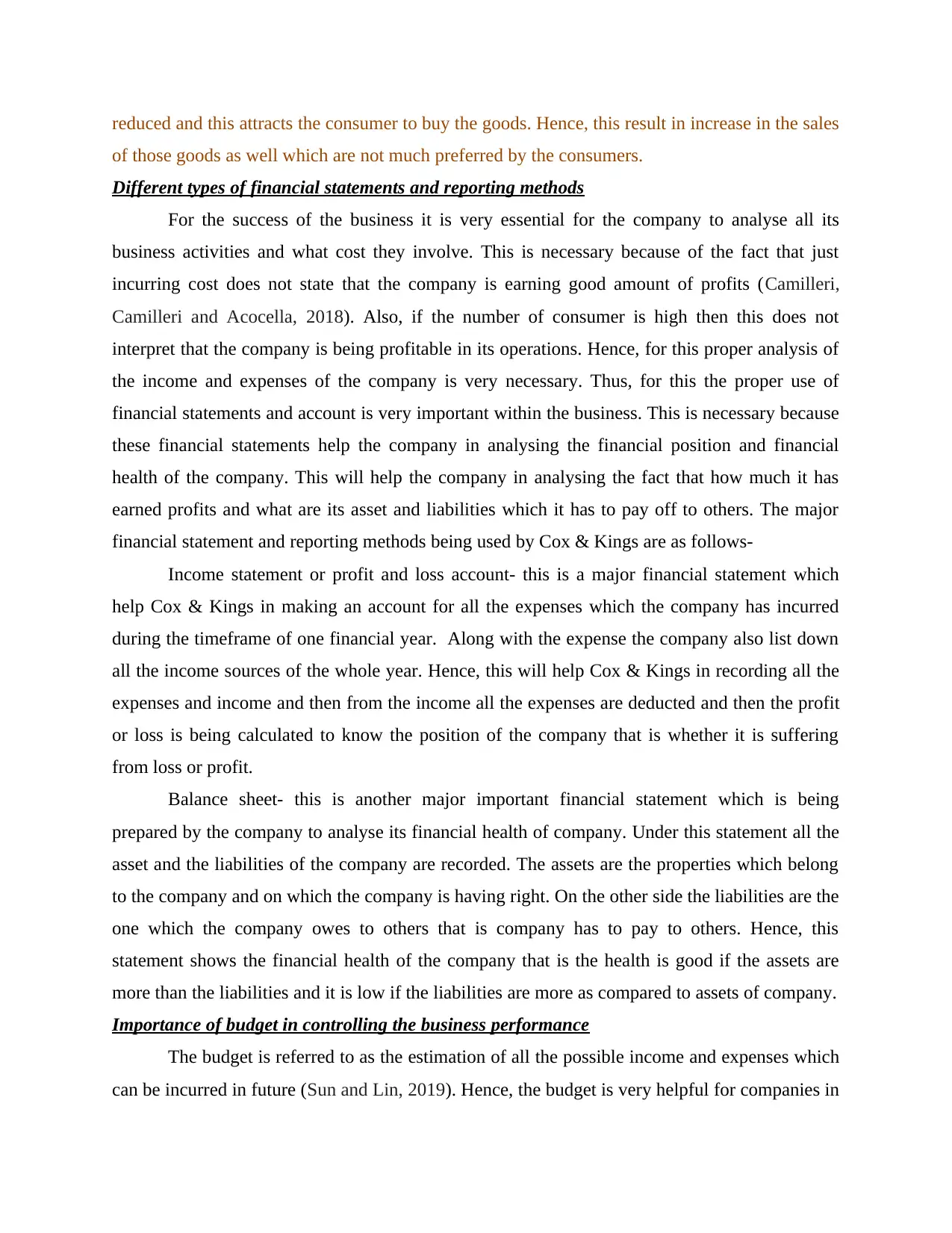
reduced and this attracts the consumer to buy the goods. Hence, this result in increase in the sales
of those goods as well which are not much preferred by the consumers.
Different types of financial statements and reporting methods
For the success of the business it is very essential for the company to analyse all its
business activities and what cost they involve. This is necessary because of the fact that just
incurring cost does not state that the company is earning good amount of profits (Camilleri,
Camilleri and Acocella, 2018). Also, if the number of consumer is high then this does not
interpret that the company is being profitable in its operations. Hence, for this proper analysis of
the income and expenses of the company is very necessary. Thus, for this the proper use of
financial statements and account is very important within the business. This is necessary because
these financial statements help the company in analysing the financial position and financial
health of the company. This will help the company in analysing the fact that how much it has
earned profits and what are its asset and liabilities which it has to pay off to others. The major
financial statement and reporting methods being used by Cox & Kings are as follows-
Income statement or profit and loss account- this is a major financial statement which
help Cox & Kings in making an account for all the expenses which the company has incurred
during the timeframe of one financial year. Along with the expense the company also list down
all the income sources of the whole year. Hence, this will help Cox & Kings in recording all the
expenses and income and then from the income all the expenses are deducted and then the profit
or loss is being calculated to know the position of the company that is whether it is suffering
from loss or profit.
Balance sheet- this is another major important financial statement which is being
prepared by the company to analyse its financial health of company. Under this statement all the
asset and the liabilities of the company are recorded. The assets are the properties which belong
to the company and on which the company is having right. On the other side the liabilities are the
one which the company owes to others that is company has to pay to others. Hence, this
statement shows the financial health of the company that is the health is good if the assets are
more than the liabilities and it is low if the liabilities are more as compared to assets of company.
Importance of budget in controlling the business performance
The budget is referred to as the estimation of all the possible income and expenses which
can be incurred in future (Sun and Lin, 2019). Hence, the budget is very helpful for companies in
of those goods as well which are not much preferred by the consumers.
Different types of financial statements and reporting methods
For the success of the business it is very essential for the company to analyse all its
business activities and what cost they involve. This is necessary because of the fact that just
incurring cost does not state that the company is earning good amount of profits (Camilleri,
Camilleri and Acocella, 2018). Also, if the number of consumer is high then this does not
interpret that the company is being profitable in its operations. Hence, for this proper analysis of
the income and expenses of the company is very necessary. Thus, for this the proper use of
financial statements and account is very important within the business. This is necessary because
these financial statements help the company in analysing the financial position and financial
health of the company. This will help the company in analysing the fact that how much it has
earned profits and what are its asset and liabilities which it has to pay off to others. The major
financial statement and reporting methods being used by Cox & Kings are as follows-
Income statement or profit and loss account- this is a major financial statement which
help Cox & Kings in making an account for all the expenses which the company has incurred
during the timeframe of one financial year. Along with the expense the company also list down
all the income sources of the whole year. Hence, this will help Cox & Kings in recording all the
expenses and income and then from the income all the expenses are deducted and then the profit
or loss is being calculated to know the position of the company that is whether it is suffering
from loss or profit.
Balance sheet- this is another major important financial statement which is being
prepared by the company to analyse its financial health of company. Under this statement all the
asset and the liabilities of the company are recorded. The assets are the properties which belong
to the company and on which the company is having right. On the other side the liabilities are the
one which the company owes to others that is company has to pay to others. Hence, this
statement shows the financial health of the company that is the health is good if the assets are
more than the liabilities and it is low if the liabilities are more as compared to assets of company.
Importance of budget in controlling the business performance
The budget is referred to as the estimation of all the possible income and expenses which
can be incurred in future (Sun and Lin, 2019). Hence, the budget is very helpful for companies in
⊘ This is a preview!⊘
Do you want full access?
Subscribe today to unlock all pages.

Trusted by 1+ million students worldwide
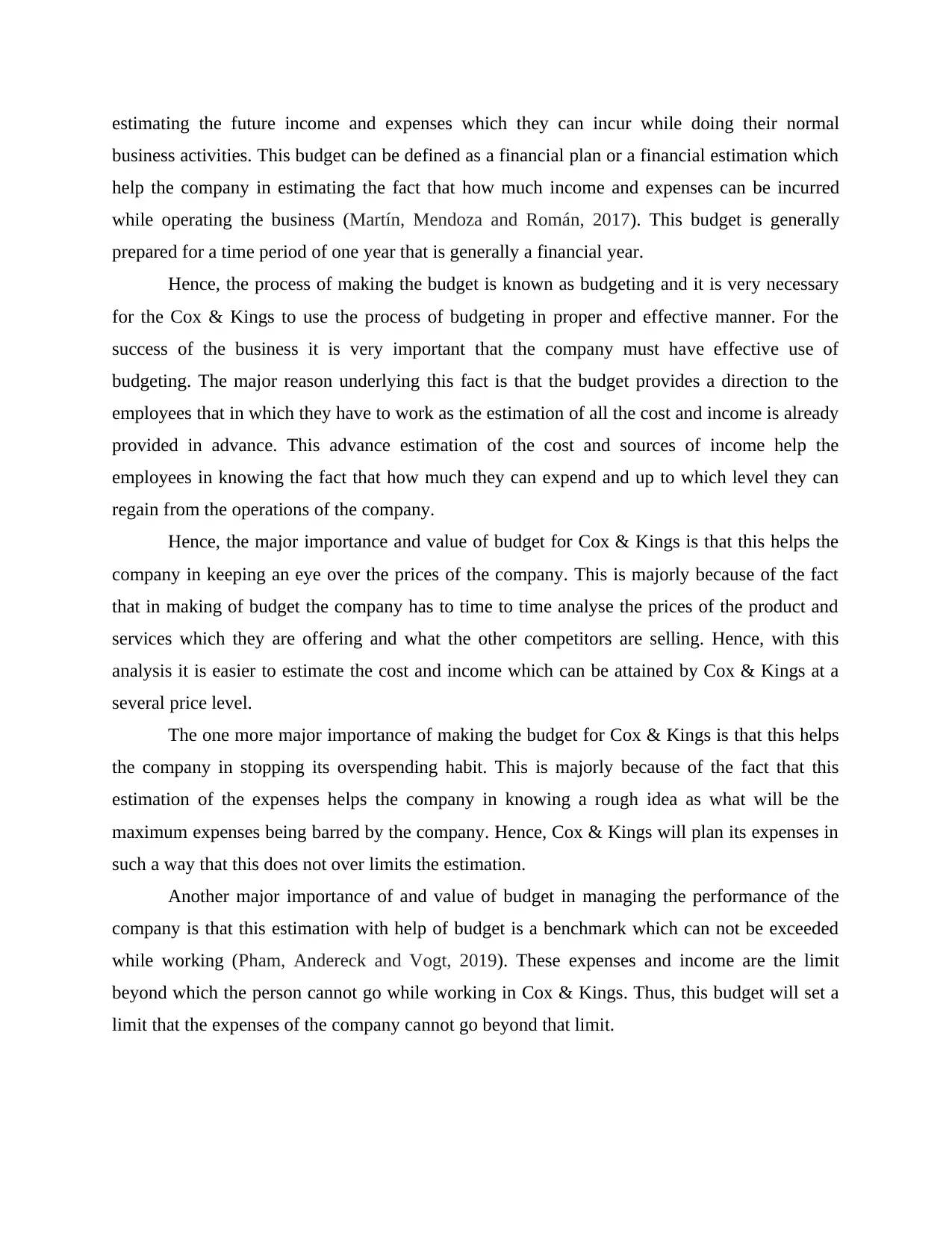
estimating the future income and expenses which they can incur while doing their normal
business activities. This budget can be defined as a financial plan or a financial estimation which
help the company in estimating the fact that how much income and expenses can be incurred
while operating the business (Martín, Mendoza and Román, 2017). This budget is generally
prepared for a time period of one year that is generally a financial year.
Hence, the process of making the budget is known as budgeting and it is very necessary
for the Cox & Kings to use the process of budgeting in proper and effective manner. For the
success of the business it is very important that the company must have effective use of
budgeting. The major reason underlying this fact is that the budget provides a direction to the
employees that in which they have to work as the estimation of all the cost and income is already
provided in advance. This advance estimation of the cost and sources of income help the
employees in knowing the fact that how much they can expend and up to which level they can
regain from the operations of the company.
Hence, the major importance and value of budget for Cox & Kings is that this helps the
company in keeping an eye over the prices of the company. This is majorly because of the fact
that in making of budget the company has to time to time analyse the prices of the product and
services which they are offering and what the other competitors are selling. Hence, with this
analysis it is easier to estimate the cost and income which can be attained by Cox & Kings at a
several price level.
The one more major importance of making the budget for Cox & Kings is that this helps
the company in stopping its overspending habit. This is majorly because of the fact that this
estimation of the expenses helps the company in knowing a rough idea as what will be the
maximum expenses being barred by the company. Hence, Cox & Kings will plan its expenses in
such a way that this does not over limits the estimation.
Another major importance of and value of budget in managing the performance of the
company is that this estimation with help of budget is a benchmark which can not be exceeded
while working (Pham, Andereck and Vogt, 2019). These expenses and income are the limit
beyond which the person cannot go while working in Cox & Kings. Thus, this budget will set a
limit that the expenses of the company cannot go beyond that limit.
business activities. This budget can be defined as a financial plan or a financial estimation which
help the company in estimating the fact that how much income and expenses can be incurred
while operating the business (Martín, Mendoza and Román, 2017). This budget is generally
prepared for a time period of one year that is generally a financial year.
Hence, the process of making the budget is known as budgeting and it is very necessary
for the Cox & Kings to use the process of budgeting in proper and effective manner. For the
success of the business it is very important that the company must have effective use of
budgeting. The major reason underlying this fact is that the budget provides a direction to the
employees that in which they have to work as the estimation of all the cost and income is already
provided in advance. This advance estimation of the cost and sources of income help the
employees in knowing the fact that how much they can expend and up to which level they can
regain from the operations of the company.
Hence, the major importance and value of budget for Cox & Kings is that this helps the
company in keeping an eye over the prices of the company. This is majorly because of the fact
that in making of budget the company has to time to time analyse the prices of the product and
services which they are offering and what the other competitors are selling. Hence, with this
analysis it is easier to estimate the cost and income which can be attained by Cox & Kings at a
several price level.
The one more major importance of making the budget for Cox & Kings is that this helps
the company in stopping its overspending habit. This is majorly because of the fact that this
estimation of the expenses helps the company in knowing a rough idea as what will be the
maximum expenses being barred by the company. Hence, Cox & Kings will plan its expenses in
such a way that this does not over limits the estimation.
Another major importance of and value of budget in managing the performance of the
company is that this estimation with help of budget is a benchmark which can not be exceeded
while working (Pham, Andereck and Vogt, 2019). These expenses and income are the limit
beyond which the person cannot go while working in Cox & Kings. Thus, this budget will set a
limit that the expenses of the company cannot go beyond that limit.
Paraphrase This Document
Need a fresh take? Get an instant paraphrase of this document with our AI Paraphraser
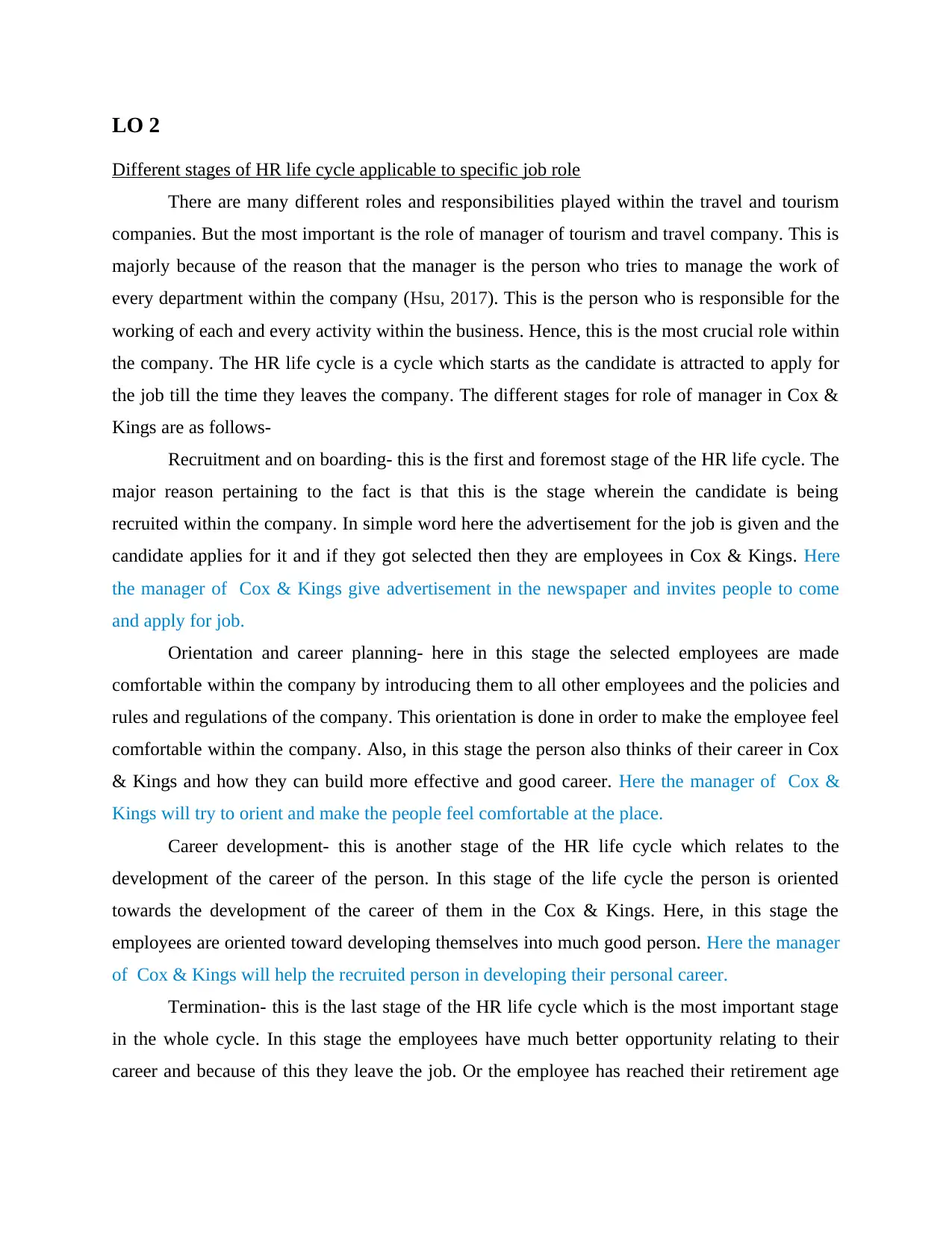
LO 2
Different stages of HR life cycle applicable to specific job role
There are many different roles and responsibilities played within the travel and tourism
companies. But the most important is the role of manager of tourism and travel company. This is
majorly because of the reason that the manager is the person who tries to manage the work of
every department within the company (Hsu, 2017). This is the person who is responsible for the
working of each and every activity within the business. Hence, this is the most crucial role within
the company. The HR life cycle is a cycle which starts as the candidate is attracted to apply for
the job till the time they leaves the company. The different stages for role of manager in Cox &
Kings are as follows-
Recruitment and on boarding- this is the first and foremost stage of the HR life cycle. The
major reason pertaining to the fact is that this is the stage wherein the candidate is being
recruited within the company. In simple word here the advertisement for the job is given and the
candidate applies for it and if they got selected then they are employees in Cox & Kings. Here
the manager of Cox & Kings give advertisement in the newspaper and invites people to come
and apply for job.
Orientation and career planning- here in this stage the selected employees are made
comfortable within the company by introducing them to all other employees and the policies and
rules and regulations of the company. This orientation is done in order to make the employee feel
comfortable within the company. Also, in this stage the person also thinks of their career in Cox
& Kings and how they can build more effective and good career. Here the manager of Cox &
Kings will try to orient and make the people feel comfortable at the place.
Career development- this is another stage of the HR life cycle which relates to the
development of the career of the person. In this stage of the life cycle the person is oriented
towards the development of the career of them in the Cox & Kings. Here, in this stage the
employees are oriented toward developing themselves into much good person. Here the manager
of Cox & Kings will help the recruited person in developing their personal career.
Termination- this is the last stage of the HR life cycle which is the most important stage
in the whole cycle. In this stage the employees have much better opportunity relating to their
career and because of this they leave the job. Or the employee has reached their retirement age
Different stages of HR life cycle applicable to specific job role
There are many different roles and responsibilities played within the travel and tourism
companies. But the most important is the role of manager of tourism and travel company. This is
majorly because of the reason that the manager is the person who tries to manage the work of
every department within the company (Hsu, 2017). This is the person who is responsible for the
working of each and every activity within the business. Hence, this is the most crucial role within
the company. The HR life cycle is a cycle which starts as the candidate is attracted to apply for
the job till the time they leaves the company. The different stages for role of manager in Cox &
Kings are as follows-
Recruitment and on boarding- this is the first and foremost stage of the HR life cycle. The
major reason pertaining to the fact is that this is the stage wherein the candidate is being
recruited within the company. In simple word here the advertisement for the job is given and the
candidate applies for it and if they got selected then they are employees in Cox & Kings. Here
the manager of Cox & Kings give advertisement in the newspaper and invites people to come
and apply for job.
Orientation and career planning- here in this stage the selected employees are made
comfortable within the company by introducing them to all other employees and the policies and
rules and regulations of the company. This orientation is done in order to make the employee feel
comfortable within the company. Also, in this stage the person also thinks of their career in Cox
& Kings and how they can build more effective and good career. Here the manager of Cox &
Kings will try to orient and make the people feel comfortable at the place.
Career development- this is another stage of the HR life cycle which relates to the
development of the career of the person. In this stage of the life cycle the person is oriented
towards the development of the career of them in the Cox & Kings. Here, in this stage the
employees are oriented toward developing themselves into much good person. Here the manager
of Cox & Kings will help the recruited person in developing their personal career.
Termination- this is the last stage of the HR life cycle which is the most important stage
in the whole cycle. In this stage the employees have much better opportunity relating to their
career and because of this they leave the job. Or the employee has reached their retirement age
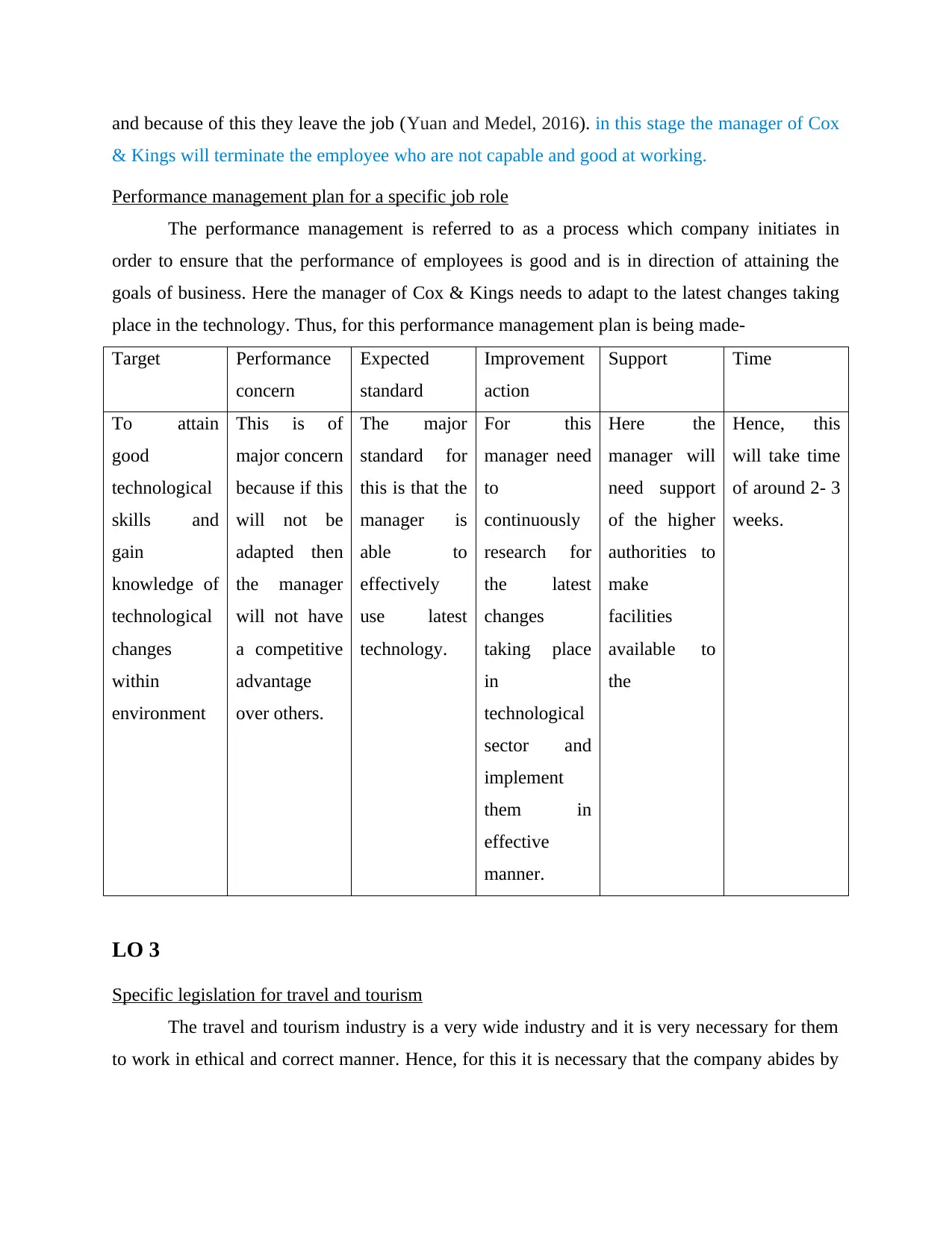
and because of this they leave the job (Yuan and Medel, 2016). in this stage the manager of Cox
& Kings will terminate the employee who are not capable and good at working.
Performance management plan for a specific job role
The performance management is referred to as a process which company initiates in
order to ensure that the performance of employees is good and is in direction of attaining the
goals of business. Here the manager of Cox & Kings needs to adapt to the latest changes taking
place in the technology. Thus, for this performance management plan is being made-
Target Performance
concern
Expected
standard
Improvement
action
Support Time
To attain
good
technological
skills and
gain
knowledge of
technological
changes
within
environment
This is of
major concern
because if this
will not be
adapted then
the manager
will not have
a competitive
advantage
over others.
The major
standard for
this is that the
manager is
able to
effectively
use latest
technology.
For this
manager need
to
continuously
research for
the latest
changes
taking place
in
technological
sector and
implement
them in
effective
manner.
Here the
manager will
need support
of the higher
authorities to
make
facilities
available to
the
Hence, this
will take time
of around 2- 3
weeks.
LO 3
Specific legislation for travel and tourism
The travel and tourism industry is a very wide industry and it is very necessary for them
to work in ethical and correct manner. Hence, for this it is necessary that the company abides by
& Kings will terminate the employee who are not capable and good at working.
Performance management plan for a specific job role
The performance management is referred to as a process which company initiates in
order to ensure that the performance of employees is good and is in direction of attaining the
goals of business. Here the manager of Cox & Kings needs to adapt to the latest changes taking
place in the technology. Thus, for this performance management plan is being made-
Target Performance
concern
Expected
standard
Improvement
action
Support Time
To attain
good
technological
skills and
gain
knowledge of
technological
changes
within
environment
This is of
major concern
because if this
will not be
adapted then
the manager
will not have
a competitive
advantage
over others.
The major
standard for
this is that the
manager is
able to
effectively
use latest
technology.
For this
manager need
to
continuously
research for
the latest
changes
taking place
in
technological
sector and
implement
them in
effective
manner.
Here the
manager will
need support
of the higher
authorities to
make
facilities
available to
the
Hence, this
will take time
of around 2- 3
weeks.
LO 3
Specific legislation for travel and tourism
The travel and tourism industry is a very wide industry and it is very necessary for them
to work in ethical and correct manner. Hence, for this it is necessary that the company abides by
⊘ This is a preview!⊘
Do you want full access?
Subscribe today to unlock all pages.

Trusted by 1+ million students worldwide
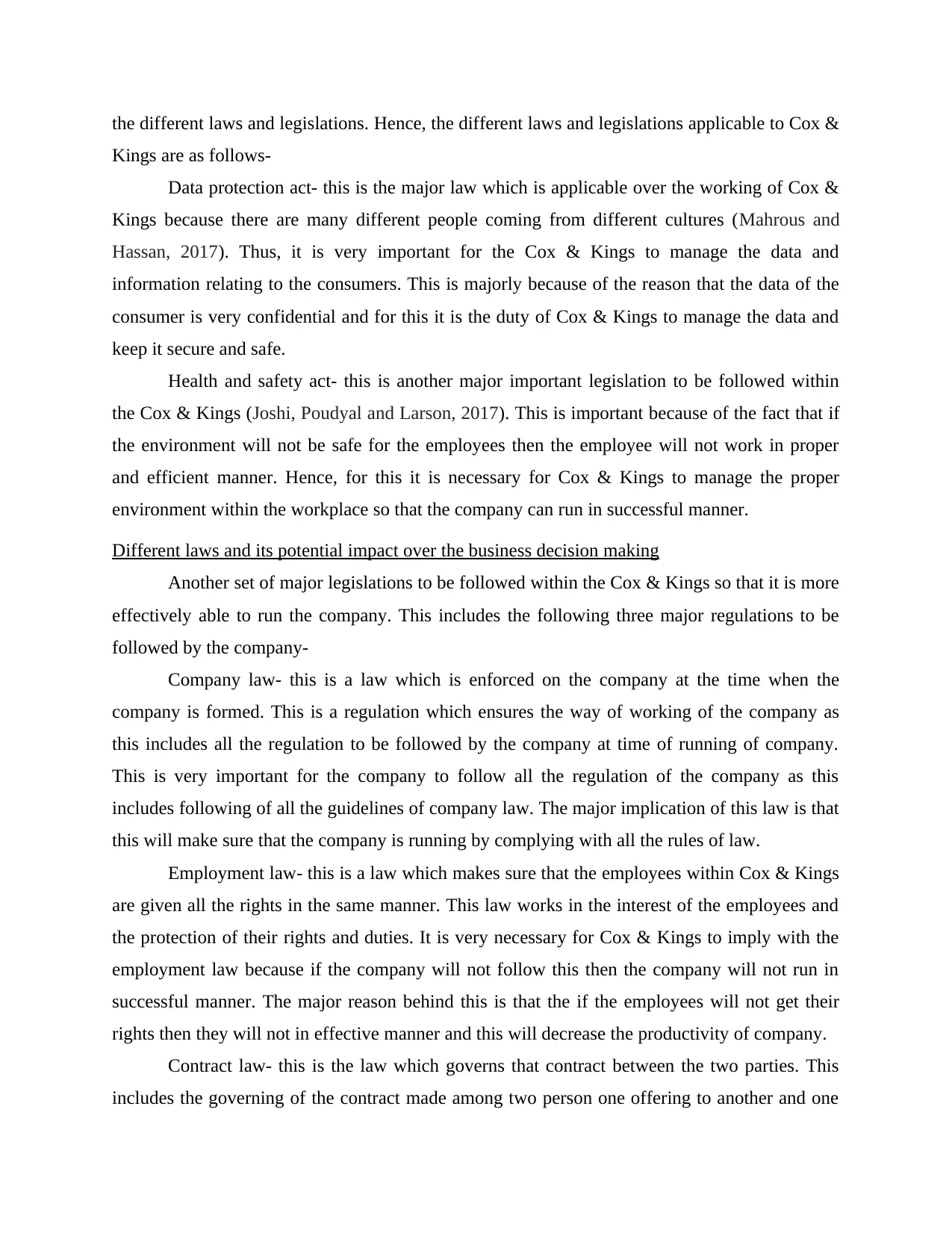
the different laws and legislations. Hence, the different laws and legislations applicable to Cox &
Kings are as follows-
Data protection act- this is the major law which is applicable over the working of Cox &
Kings because there are many different people coming from different cultures (Mahrous and
Hassan, 2017). Thus, it is very important for the Cox & Kings to manage the data and
information relating to the consumers. This is majorly because of the reason that the data of the
consumer is very confidential and for this it is the duty of Cox & Kings to manage the data and
keep it secure and safe.
Health and safety act- this is another major important legislation to be followed within
the Cox & Kings (Joshi, Poudyal and Larson, 2017). This is important because of the fact that if
the environment will not be safe for the employees then the employee will not work in proper
and efficient manner. Hence, for this it is necessary for Cox & Kings to manage the proper
environment within the workplace so that the company can run in successful manner.
Different laws and its potential impact over the business decision making
Another set of major legislations to be followed within the Cox & Kings so that it is more
effectively able to run the company. This includes the following three major regulations to be
followed by the company-
Company law- this is a law which is enforced on the company at the time when the
company is formed. This is a regulation which ensures the way of working of the company as
this includes all the regulation to be followed by the company at time of running of company.
This is very important for the company to follow all the regulation of the company as this
includes following of all the guidelines of company law. The major implication of this law is that
this will make sure that the company is running by complying with all the rules of law.
Employment law- this is a law which makes sure that the employees within Cox & Kings
are given all the rights in the same manner. This law works in the interest of the employees and
the protection of their rights and duties. It is very necessary for Cox & Kings to imply with the
employment law because if the company will not follow this then the company will not run in
successful manner. The major reason behind this is that the if the employees will not get their
rights then they will not in effective manner and this will decrease the productivity of company.
Contract law- this is the law which governs that contract between the two parties. This
includes the governing of the contract made among two person one offering to another and one
Kings are as follows-
Data protection act- this is the major law which is applicable over the working of Cox &
Kings because there are many different people coming from different cultures (Mahrous and
Hassan, 2017). Thus, it is very important for the Cox & Kings to manage the data and
information relating to the consumers. This is majorly because of the reason that the data of the
consumer is very confidential and for this it is the duty of Cox & Kings to manage the data and
keep it secure and safe.
Health and safety act- this is another major important legislation to be followed within
the Cox & Kings (Joshi, Poudyal and Larson, 2017). This is important because of the fact that if
the environment will not be safe for the employees then the employee will not work in proper
and efficient manner. Hence, for this it is necessary for Cox & Kings to manage the proper
environment within the workplace so that the company can run in successful manner.
Different laws and its potential impact over the business decision making
Another set of major legislations to be followed within the Cox & Kings so that it is more
effectively able to run the company. This includes the following three major regulations to be
followed by the company-
Company law- this is a law which is enforced on the company at the time when the
company is formed. This is a regulation which ensures the way of working of the company as
this includes all the regulation to be followed by the company at time of running of company.
This is very important for the company to follow all the regulation of the company as this
includes following of all the guidelines of company law. The major implication of this law is that
this will make sure that the company is running by complying with all the rules of law.
Employment law- this is a law which makes sure that the employees within Cox & Kings
are given all the rights in the same manner. This law works in the interest of the employees and
the protection of their rights and duties. It is very necessary for Cox & Kings to imply with the
employment law because if the company will not follow this then the company will not run in
successful manner. The major reason behind this is that the if the employees will not get their
rights then they will not in effective manner and this will decrease the productivity of company.
Contract law- this is the law which governs that contract between the two parties. This
includes the governing of the contract made among two person one offering to another and one
Paraphrase This Document
Need a fresh take? Get an instant paraphrase of this document with our AI Paraphraser
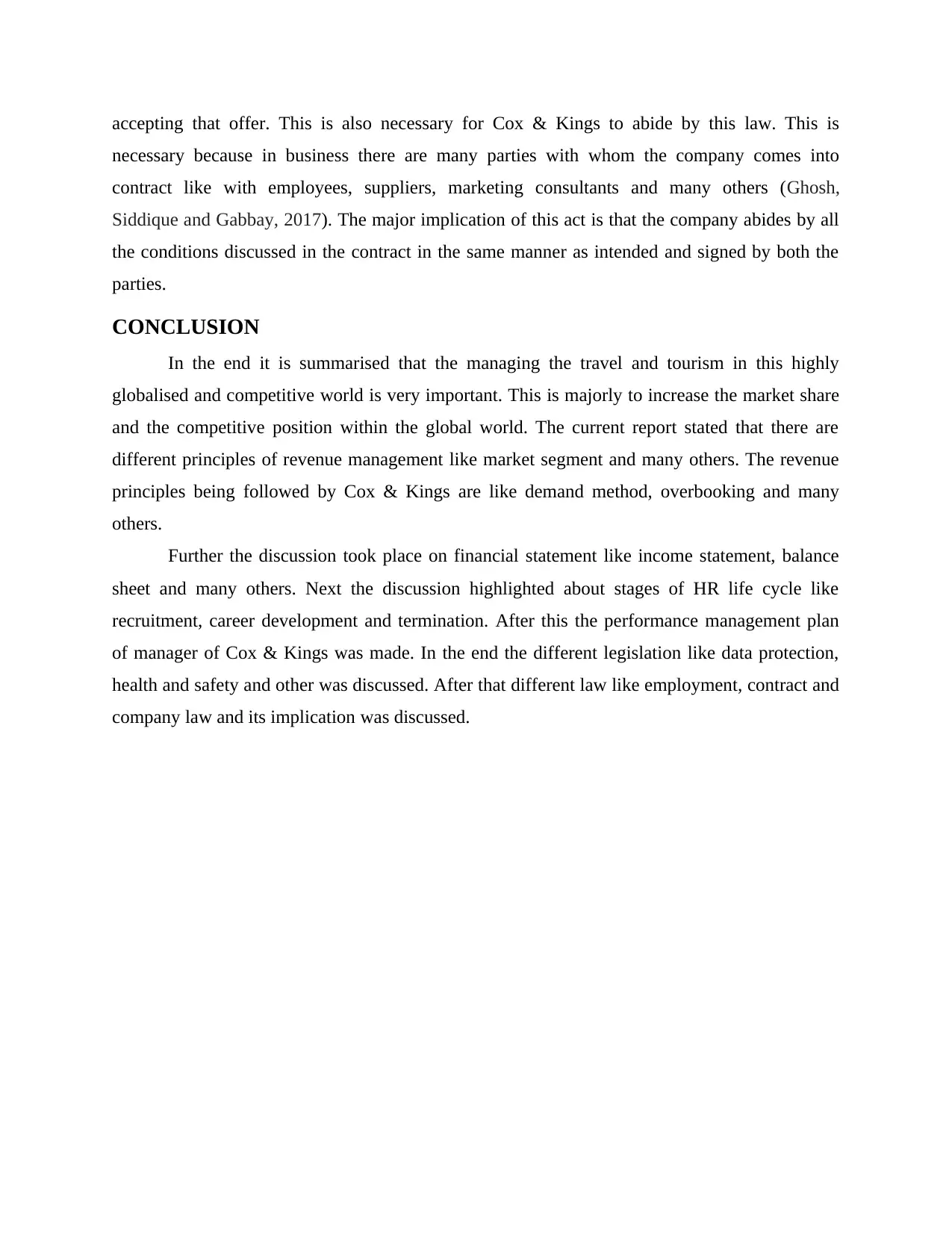
accepting that offer. This is also necessary for Cox & Kings to abide by this law. This is
necessary because in business there are many parties with whom the company comes into
contract like with employees, suppliers, marketing consultants and many others (Ghosh,
Siddique and Gabbay, 2017). The major implication of this act is that the company abides by all
the conditions discussed in the contract in the same manner as intended and signed by both the
parties.
CONCLUSION
In the end it is summarised that the managing the travel and tourism in this highly
globalised and competitive world is very important. This is majorly to increase the market share
and the competitive position within the global world. The current report stated that there are
different principles of revenue management like market segment and many others. The revenue
principles being followed by Cox & Kings are like demand method, overbooking and many
others.
Further the discussion took place on financial statement like income statement, balance
sheet and many others. Next the discussion highlighted about stages of HR life cycle like
recruitment, career development and termination. After this the performance management plan
of manager of Cox & Kings was made. In the end the different legislation like data protection,
health and safety and other was discussed. After that different law like employment, contract and
company law and its implication was discussed.
necessary because in business there are many parties with whom the company comes into
contract like with employees, suppliers, marketing consultants and many others (Ghosh,
Siddique and Gabbay, 2017). The major implication of this act is that the company abides by all
the conditions discussed in the contract in the same manner as intended and signed by both the
parties.
CONCLUSION
In the end it is summarised that the managing the travel and tourism in this highly
globalised and competitive world is very important. This is majorly to increase the market share
and the competitive position within the global world. The current report stated that there are
different principles of revenue management like market segment and many others. The revenue
principles being followed by Cox & Kings are like demand method, overbooking and many
others.
Further the discussion took place on financial statement like income statement, balance
sheet and many others. Next the discussion highlighted about stages of HR life cycle like
recruitment, career development and termination. After this the performance management plan
of manager of Cox & Kings was made. In the end the different legislation like data protection,
health and safety and other was discussed. After that different law like employment, contract and
company law and its implication was discussed.
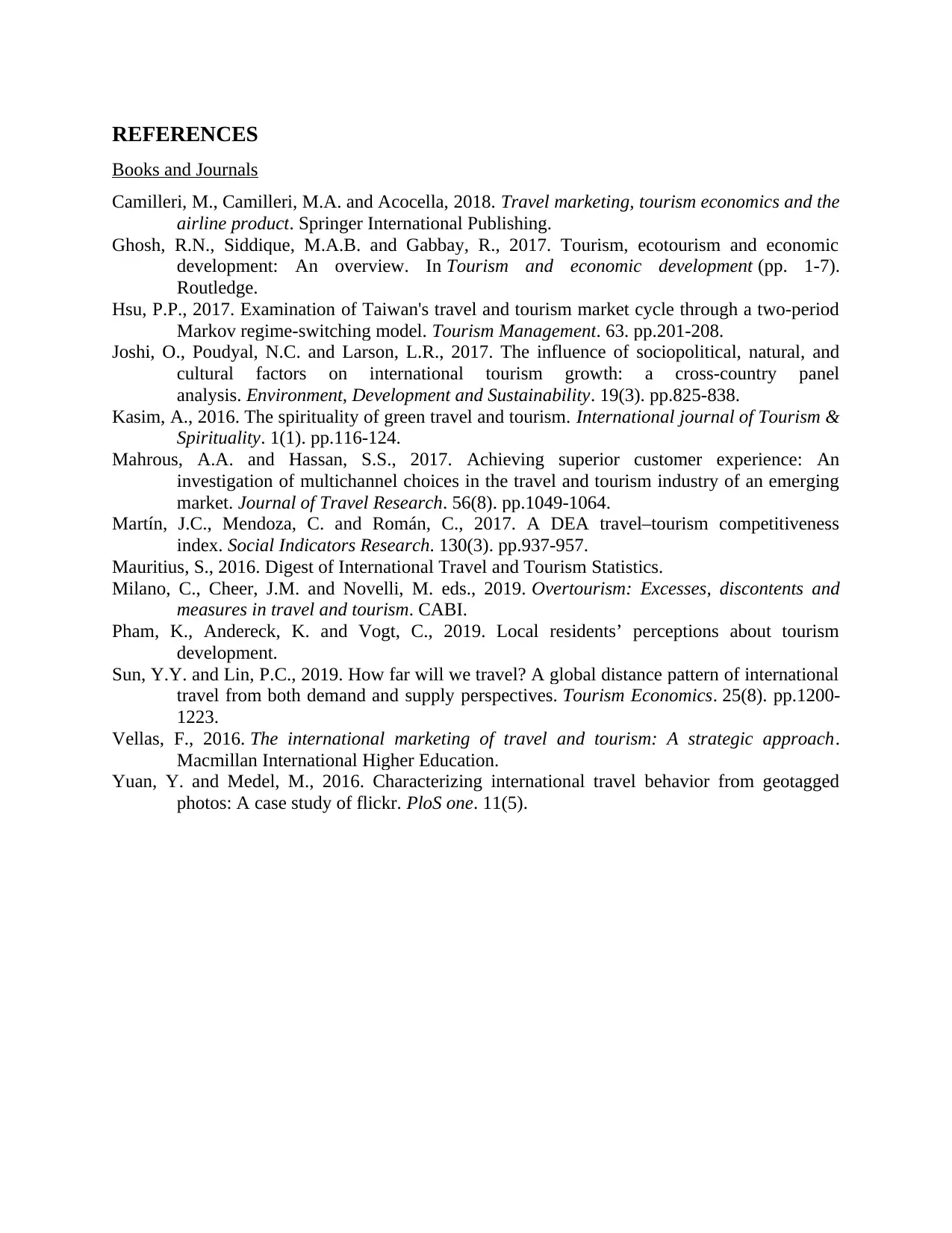
REFERENCES
Books and Journals
Camilleri, M., Camilleri, M.A. and Acocella, 2018. Travel marketing, tourism economics and the
airline product. Springer International Publishing.
Ghosh, R.N., Siddique, M.A.B. and Gabbay, R., 2017. Tourism, ecotourism and economic
development: An overview. In Tourism and economic development (pp. 1-7).
Routledge.
Hsu, P.P., 2017. Examination of Taiwan's travel and tourism market cycle through a two-period
Markov regime-switching model. Tourism Management. 63. pp.201-208.
Joshi, O., Poudyal, N.C. and Larson, L.R., 2017. The influence of sociopolitical, natural, and
cultural factors on international tourism growth: a cross-country panel
analysis. Environment, Development and Sustainability. 19(3). pp.825-838.
Kasim, A., 2016. The spirituality of green travel and tourism. International journal of Tourism &
Spirituality. 1(1). pp.116-124.
Mahrous, A.A. and Hassan, S.S., 2017. Achieving superior customer experience: An
investigation of multichannel choices in the travel and tourism industry of an emerging
market. Journal of Travel Research. 56(8). pp.1049-1064.
Martín, J.C., Mendoza, C. and Román, C., 2017. A DEA travel–tourism competitiveness
index. Social Indicators Research. 130(3). pp.937-957.
Mauritius, S., 2016. Digest of International Travel and Tourism Statistics.
Milano, C., Cheer, J.M. and Novelli, M. eds., 2019. Overtourism: Excesses, discontents and
measures in travel and tourism. CABI.
Pham, K., Andereck, K. and Vogt, C., 2019. Local residents’ perceptions about tourism
development.
Sun, Y.Y. and Lin, P.C., 2019. How far will we travel? A global distance pattern of international
travel from both demand and supply perspectives. Tourism Economics. 25(8). pp.1200-
1223.
Vellas, F., 2016. The international marketing of travel and tourism: A strategic approach.
Macmillan International Higher Education.
Yuan, Y. and Medel, M., 2016. Characterizing international travel behavior from geotagged
photos: A case study of flickr. PloS one. 11(5).
Books and Journals
Camilleri, M., Camilleri, M.A. and Acocella, 2018. Travel marketing, tourism economics and the
airline product. Springer International Publishing.
Ghosh, R.N., Siddique, M.A.B. and Gabbay, R., 2017. Tourism, ecotourism and economic
development: An overview. In Tourism and economic development (pp. 1-7).
Routledge.
Hsu, P.P., 2017. Examination of Taiwan's travel and tourism market cycle through a two-period
Markov regime-switching model. Tourism Management. 63. pp.201-208.
Joshi, O., Poudyal, N.C. and Larson, L.R., 2017. The influence of sociopolitical, natural, and
cultural factors on international tourism growth: a cross-country panel
analysis. Environment, Development and Sustainability. 19(3). pp.825-838.
Kasim, A., 2016. The spirituality of green travel and tourism. International journal of Tourism &
Spirituality. 1(1). pp.116-124.
Mahrous, A.A. and Hassan, S.S., 2017. Achieving superior customer experience: An
investigation of multichannel choices in the travel and tourism industry of an emerging
market. Journal of Travel Research. 56(8). pp.1049-1064.
Martín, J.C., Mendoza, C. and Román, C., 2017. A DEA travel–tourism competitiveness
index. Social Indicators Research. 130(3). pp.937-957.
Mauritius, S., 2016. Digest of International Travel and Tourism Statistics.
Milano, C., Cheer, J.M. and Novelli, M. eds., 2019. Overtourism: Excesses, discontents and
measures in travel and tourism. CABI.
Pham, K., Andereck, K. and Vogt, C., 2019. Local residents’ perceptions about tourism
development.
Sun, Y.Y. and Lin, P.C., 2019. How far will we travel? A global distance pattern of international
travel from both demand and supply perspectives. Tourism Economics. 25(8). pp.1200-
1223.
Vellas, F., 2016. The international marketing of travel and tourism: A strategic approach.
Macmillan International Higher Education.
Yuan, Y. and Medel, M., 2016. Characterizing international travel behavior from geotagged
photos: A case study of flickr. PloS one. 11(5).
⊘ This is a preview!⊘
Do you want full access?
Subscribe today to unlock all pages.

Trusted by 1+ million students worldwide
1 out of 12
Related Documents
Your All-in-One AI-Powered Toolkit for Academic Success.
+13062052269
info@desklib.com
Available 24*7 on WhatsApp / Email
![[object Object]](/_next/static/media/star-bottom.7253800d.svg)
Unlock your academic potential
Copyright © 2020–2026 A2Z Services. All Rights Reserved. Developed and managed by ZUCOL.





